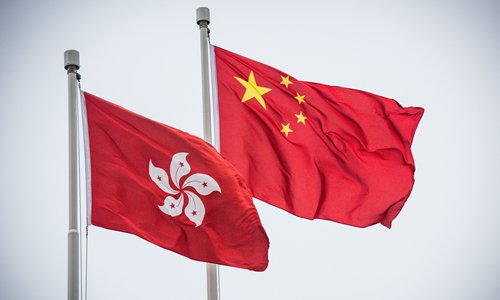HOME >> OPINION,SPECIAL-COVERAGE
HK’s future lies with China, not with the West
By He Liangliang Source:Global Times Published: 2019/8/15 20:58:40

Photo: IC
For the past two months, Hong Kong has been facing its most severe crisis since its return to China. This has had a terrible effect on the city's economic and social development.
Commonly seen in societies that have undergone color revolutions are stagnant economic development, high unemployment, especially youth unemployment, soaring prices, a high inflation rate, corrupt and incompetent ruling authorities, and seething popular discontent. Fueled by external forces, regime changes took place, but most of the new regimes failed to work out as the public had expected.
Yet that's definitely not the case with Hong Kong. With the Hong Kong Special Administrative Region (SAR) government honestly performing its duties, Hong Kong has achieved a per capita income of as much as $50,000 with a low unemployment rate. The economic growth rate stood at 3 percent in 2018. The economic and social situation in Hong Kong is totally different from that in Ukraine and North African countries where color revolutions took place.
Western media claimed that young people in Hong Kong encountered economic plight, intending to justify their riotous behavior and help them win "sympathy" from the world. But in fact, the economy is not the root cause of the current unrest in Hong Kong. From the massive demonstrations that took place on June 9, to a series of violent riots and laying siege to police stations in August, as well as the so-called strike and non-cooperation campaigns, the protesters put forward various political slogans and appeals, but few economic demands.
The cause of the massive riots in Hong Kong arose from opposition to amendments to an extradition bill, though the revised bill had nothing to do with the overwhelming majority in Hong Kong. According to the original legislation, only suspects who committed serious criminal offences shall be extradited under the bill. But this bill was demonized as one to send criminal suspects to the Chinese mainland, which triggered the storm in Hong Kong. Yet its causes had nothing to do with economy.
The main driving force of recent violent riots in Hong Kong is young people, who, after being brainwashed by certain forces with ulterior motives, were enthusiastically involved in riots and violent protests targeting the SAR government and police. They blocked roads, obstructed public transport, put up obstacles to the daily transportation in work and life of ordinary citizens, disrupted the operation of large shopping malls, and raised a stink in the airport using guerrilla tactics.
The government and public opinion have called on those young people to stop the riots, express their concerns rationally and enable the city to return to normal economic development. Plus the government has promised to take more measures to effectively resolve the difficulties confronting them, such as high property prices, lengthy waiting times for public housing applications and so on. But young people have sneered at these calls and promises.
Two months of illegal protests have begun to impact Hong Kong's economic development. The number of visitors to Hong Kong has been declining and many countries have issued warnings against traveling to Hong Kong. The consumption index in Hong Kong has been decreasing for months. The stock market has fallen and property prices, which used to keep up, have also stopped rising.
Moreover, there are signs that foreign capital may decrease.
Striving through a series of economic and social crises in its history, Hong Kong has successfully overcome them and been able to bring about new development each time. China is now the second-largest economy in the world and its influence in the international community is continuously increasing. Rioters marching with flags of the US and the UK were daydreaming of external intervention, totally ignorant of the fact that Anglo-Saxon civilization is decaying both politically and economically.
The central government of China has reserved a place for Hong Kong in the Greater Bay Area. The Chinese mainland will not sit by and watch Hong Kong decline.
Only by ending the riots can Hong Kong get back to normal. The breeze blowing toward Hong Kong in the future must come from the mainland, not from the West.
The author is a commentator with the Hong Kong-based Phoenix TV. opinion@globaltimes.com.cn
Posted in: VIEWPOINT,OPINIONS